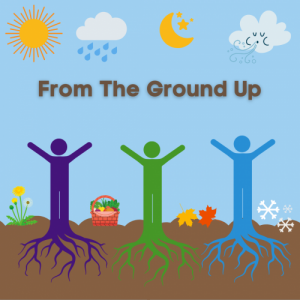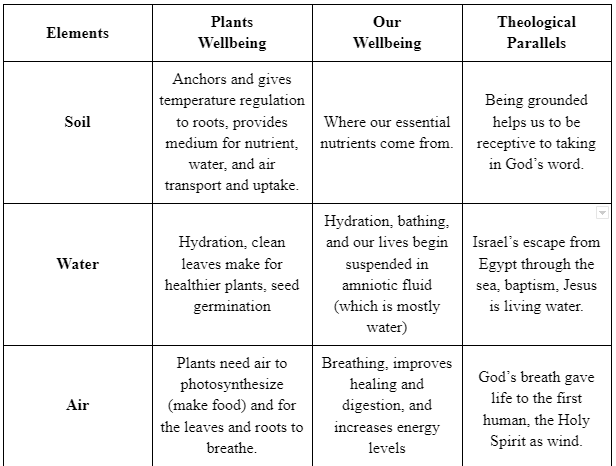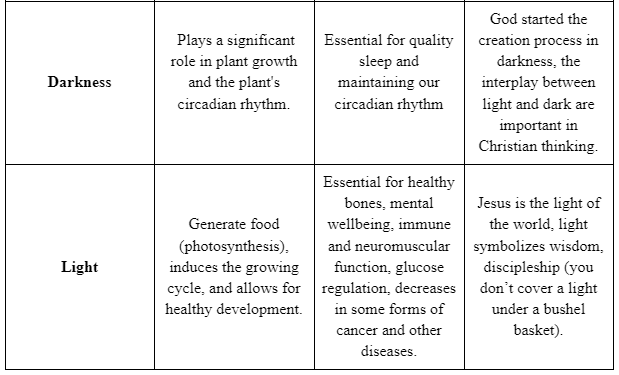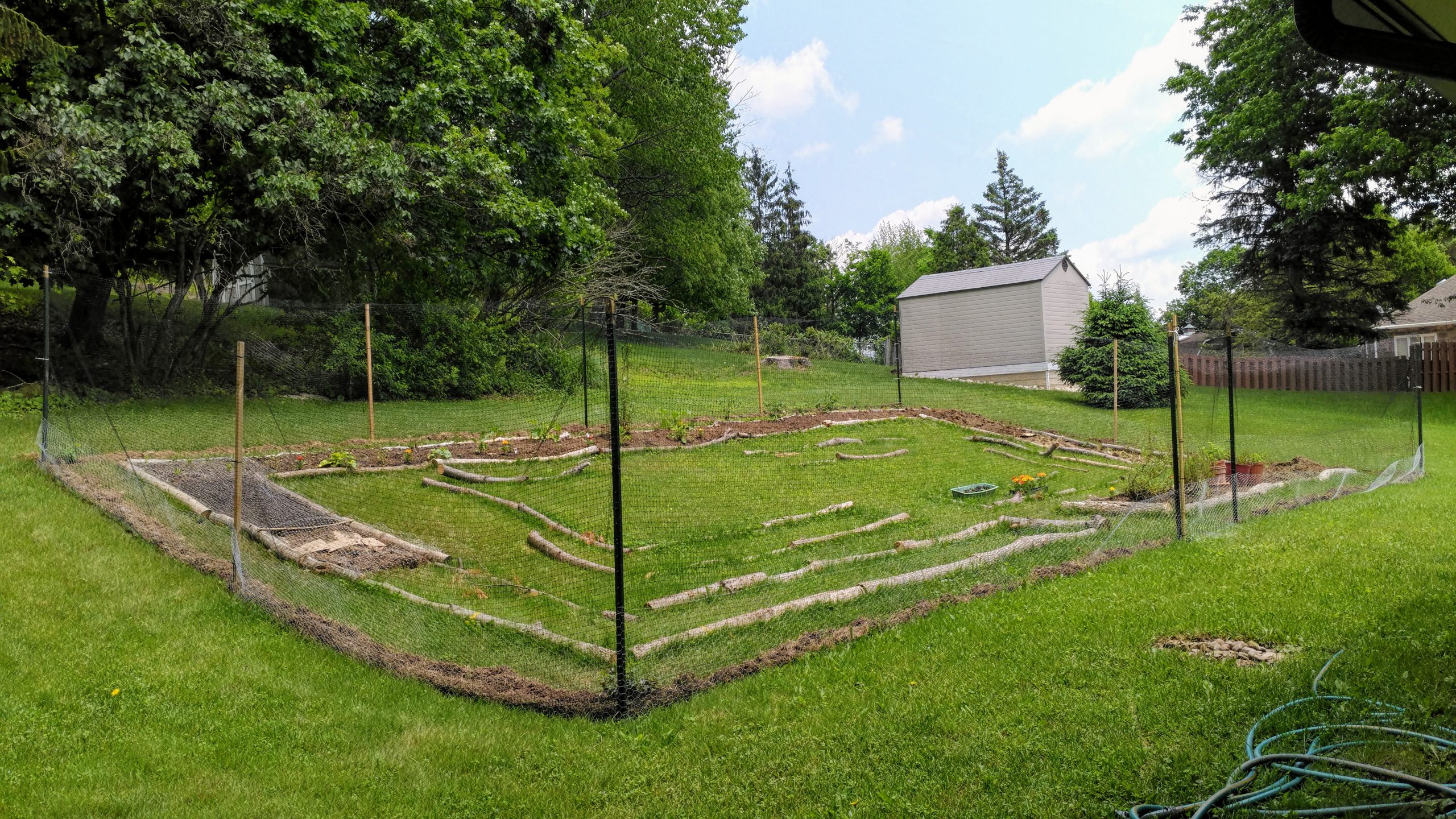
From The Ground Up: Digging Deeper Into Our Body-Garden Connection
Over the last several years, there has been a significant increase in the number of articles that discuss the health benefits that people can gain through gardening – opportunities for movement and relationship development, improved mental and spiritual wellbeing, chances to grow local/sustainable food, among other things – which is wonderful. As a gardener myself, I can attest to some of the health benefits I have personally received.
As a result of this recent attention, I have found myself increasingly drawn towards reflecting on our body-garden connection, particularly because I find that so many articles (not all) touch only on the surface-level health benefits of gardening, thus missing the richness that can come from digging more deeply into why there is such a strong connection.
So, why is gardening so good for our health?
1. I think it’s because what both our bodies and plants need to thrive are essentially the same! And, really, this shouldn’t be any surprise given that our lives started in a garden:
“And the Lord God planted a garden in Eden, in the east; and there he put the man whom he had formed. Out of the ground the Lord God made to grow every tree that is pleasant to the sight and good for food, the tree of life also in the midst of the garden, and the tree of the knowledge of good and evil.” ~Genesis 2:8-9
Because people and plants share the same basic needs, and since humans and gardens have such a long-standing relationship, it should be no surprise that there are notable theological parallels that illuminate this connection.


I have read that Jesus used agricultural illustrations because this is what people knew. However, equally important, and not frequently discussed, is the fact that there is, indeed, a fundamental link between people and plants. I believe this chart, which is far from an exhaustive comparison, is a case in point of this deep connection!
2. People and plants are both deeply impacted by what season of life they are experiencing. Spring, summer, fall, winter… new growth, maturation, flower/harvest, dormancy. Plants and people alike experience different seasons, and each season presents different needs. Paying attention to these changes, and the needs that come with them, is crucial for how we attend to the wellbeing of both our gardens and our lives: daily, weekly, monthly, yearly.
In the midst of this familiar rhythm and shared commonality of each season, then, there is also a uniqueness in the needs each season presents and, thus, how we are called to tend to ourselves in each season that plays a vital role in our collective wellbeing.
As we move through different seasons, it becomes important for us to consider some important questions, such as:
- What was used up in the previous season?
- What do we need to be particularly mindful of during this season?
For example, some plants have especially intense nutrient needs – such as nitrogen, phosphorus, and potassium – at particular times, while others use up lesser amounts. Thus, proper fertilization and crop rotation are essential for a healthy garden. As people, we, too, have certain needs at certain times. Family expectations, work obligations, health/medical challenges, celebrations (graduations, weddings, reunions), experiences of loss and/or difficult transitions (jobs, retirement, moving, death), all may bring with them different requirements, meaning how we tend to ourselves in them may change.
As such, it is important for us to make an assessment of how we are doing on a regular basis. What aspects of our wellbeing (physical, mental, emotional, spiritual, relational, etc.) are feeling parched or malnourished? What are we pleased with? What needs might require attention soon? Just as a garden needs regular care, so do we! (Click here if you would like to utilize our wellness assessment.)
3. Both people and plants need others to thrive!
In a garden, there are certain plants that get along well with each other. This is the concept of companion plants. Each has a role in the garden’s collective wellbeing. Some attract pollinators, others suppress weeds, others ward off “bad” bugs, while others provide shade. Essentially, companion plants grow well together, each contributing to the good of the other. Thus, intentionally increasing the diversity of plants increases the health of the garden.
Likewise, we need people in our lives who will help us to enrich our experience, show us new ways of thinking, expose our blind spots, and generally round out our human experience. Moreover, we also need to be willing to do this for other people, too. As with a garden, “mono-culture” is also detrimental to humans as we move through life’s various seasons.
As we enter into the summer season, I want to challenge you to do some digging around in your figurative and/or literal garden and ask yourself:
- Which of the basic elements do you feel called to tend to this season?
- What sort of companion (plants) do you need?
- What are you uniquely able to contribute to others?
May all be well,
Karen H. Webster
HSHC Co-founder/Executive Director

Trail Notes: What is the Reason for This Season?
Between it being the beginning of summer and the fact that society is starting to open up, I find that there are a lot of new opportunities starting to unfold in front of me, especially since Travis and I recently moved to a new community. As a result, I have been reflecting a lot on what my current expectations are. What do I want to prioritize right now? How do I utilize and honor the wonderful gift of time that God has given me?
One expectation I have recently wrestled with is that my initial vision of what the vegetable garden in my new home was supposed to look like this summer is vastly different both from what it currently looks like and what it will continue to look like for the next few months.
I’ll explain. One of the factors that significantly influenced our decision to purchase our new home was that it appeared to have a great space in the backyard to put a garden. This was something I was eagerly awaiting, since we had been renting a home for the past 6+ years while we lived in Decatur and most of my garden had been relegated to 5-gallon pots on the deck. The new yard appeared to be relatively flat, it was not going to require the removal of any trees or previous landscaping, and the sun exposure seemed ideal. I envisioned a garden with raised beds, framed by logs from trees that had recently been taken down in our area, positively teeming with organic fruits, vegetables, and herbs, intermixed with a variety of different flowers and shrubs to attract pollinators, repel pests, and nourish the soil for future gardening seasons. It was going to be amazing!
What I did not envision was how many hours it was going to take to put up deer and rabbit fencing or the fact that I was going to have to “tithe” a certain percentage of our produce to chipmunks. I am thankful for the opportunity to share the space with them, but I wish we could negotiate who gets what. Currently, the chipmunks are enjoying way more than their share of the strawberries!
I also did not envision how much work it was going to be to prepare the gardening space. After all, I was “only” digging up grass! Oh, and that “slight” elevation change between our driveway (where the soil was delivered) and the garden space was, paired with the fact that I am now 10+ years older than the last time I put in a garden of this size, much steeper than I anticipated!
Pair all of that with some of my current priorities in life… preparing for HSHC’s fall programming and fundraising campaign, assisting Travis with his dissertation’s data analysis, wanting to take time to visit family and friends this summer, welcoming three (unexpected, but amazing) new kittens – Theo, Barth, and Silas – into our home just a little over a week ago…
it’s been a whirlwind!
What I came to recognize and accept is that, right now, the garden is neither anything like my initial expectations (as you can see in the photo), nor can it be one of my priorities right now. And that is okay. It is something I can return to in a few months when I can more fully enjoy the process of creating it and may actually have the time to make it fit my vision a little more closely (although, as any gardener knows, gardening is never done!).
Besides, it was when I let go of my expectations for my backyard garden in this particular season that I not only discovered the other fruits in my life that wanted to be cultivated and nourished but, with the time I intended to work in the garden, I realized I can actually now pursue them.
During COVID, many of us have taken the time to evaluate our physical spaces, perhaps through removing clutter or doing a deep cleaning of the things that we may have put off reorganizing or remodeling for months (or even years). As we enter into summer and reemerge from COVID, we may all be well served to consider taking some time to assess our mental, emotional, and spiritual spaces.
Reflection Questions:
- What are some of your current expectations (personally, relationally, and beyond)? Which ones are reasonable to keep? Which ones may you need to (or can you) alter?
- What are your current priorities (responsibilities)? How are these the same as or different from what you would like your current priorities to be?
- How do you sense God calling you to use your time this summer?
P.S. As you think about how you are going to utilize your time over the next couple months, consider adding some fun! This past year has taken its toll on us in so many ways, and the health benefits that come with fun are quite remarkable. To learn more, here is an article that provides 5 research-backed reasons why we should have more fun and elaborates the benefits that we can reap in just 30 minutes of fun a day!
Peace,
Karen H. Webster
HSHC Co-founder/Executive Director
“This month shall mark for you the beginning of months; it shall be the first month of the year for you.”
Exodus 12:2
